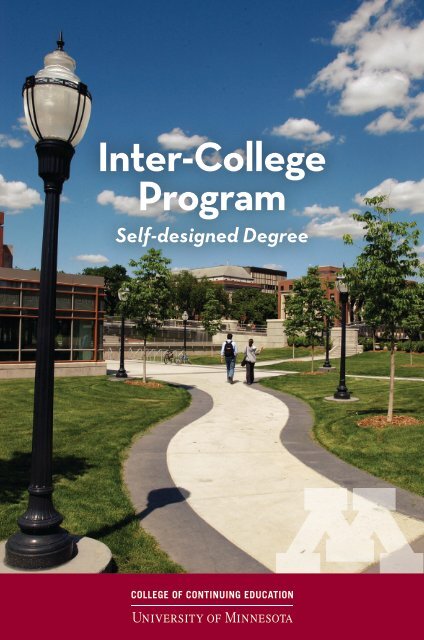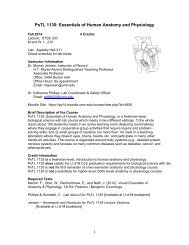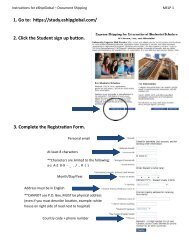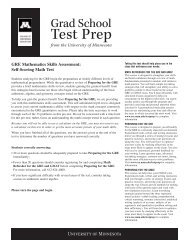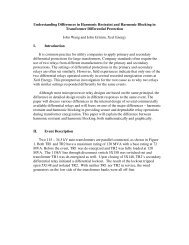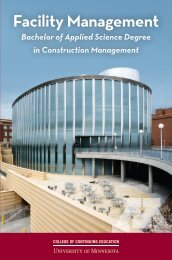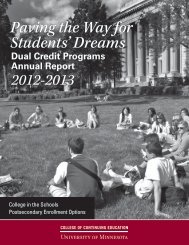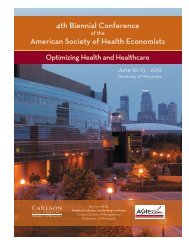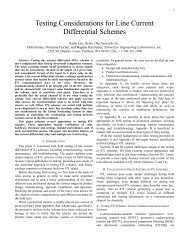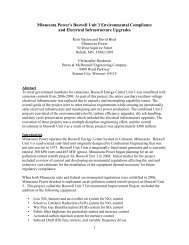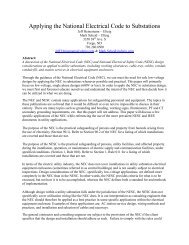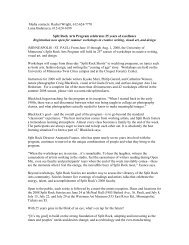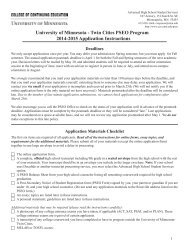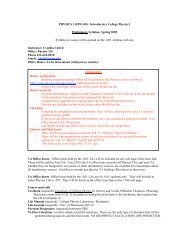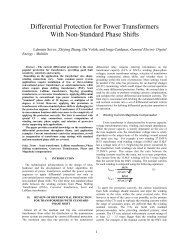ICP general brochure - College of Continuing Education - University ...
ICP general brochure - College of Continuing Education - University ...
ICP general brochure - College of Continuing Education - University ...
You also want an ePaper? Increase the reach of your titles
YUMPU automatically turns print PDFs into web optimized ePapers that Google loves.
Inter-<strong>College</strong><br />
Program<br />
Self-designed Degree
Are you a motivated learner<br />
An inquisitive idea-seeker<br />
A curious mind looking for an innovative and<br />
comprehensive undergraduate degree that<br />
is as unique as you are<br />
Biology and creative writing. Health studies and communication.<br />
Journalism, business, and psychology. If you are interested in<br />
a cross-collegiate course <strong>of</strong> study, the Inter-<strong>College</strong> Program<br />
(<strong>ICP</strong>) can help you tailor a degree path that fits your diverse<br />
interests and career aspirations.<br />
Offered through the <strong>College</strong> <strong>of</strong> <strong>Continuing</strong> <strong>Education</strong>, the <strong>ICP</strong><br />
provides students a way to access courses from the <strong>University</strong>’s<br />
more than 100 disciplines and through many <strong>of</strong> the U’s colleges,<br />
including liberal arts, biological sciences, education and human<br />
development, Carlson School <strong>of</strong> Management, among others.<br />
Your degree program will be designed by you and your advisers<br />
to match your academic interests and career goals. If you are<br />
interested in a degree that will help you prepare for future<br />
success, the <strong>University</strong> <strong>of</strong> Minnesota’s Inter-<strong>College</strong> Program<br />
can help you get there.
<strong>ICP</strong> Degree Structure<br />
The <strong>ICP</strong> degree is composed <strong>of</strong>:<br />
• The <strong>University</strong> <strong>of</strong> Minnesota’s liberal education core, theme, and writing<br />
requirements<br />
• Oral communication<br />
• Preparatory course work specific to the student’s areas <strong>of</strong> concentration<br />
• Upper-division course work taken in multiple areas <strong>of</strong> concentration <strong>of</strong> the<br />
student’s choosing<br />
• Upper-division supporting course work as appropriate<br />
Students earn either a B.A. or a B.S. degree. B.A. students have a secondlanguage<br />
requirement.<br />
Program at a Glance<br />
Degree: Bachelor <strong>of</strong> Science or<br />
Bachelor <strong>of</strong> Arts degree<br />
Admission is based on an individual<br />
review <strong>of</strong> the student’s application for<br />
program match. The review includes<br />
key factors such as grade point average,<br />
grade trends, performance in course<br />
work relevant to the proposed areas <strong>of</strong><br />
study, and the student’s demonstrated<br />
ability to meet both the curricular and<br />
developmental expectations <strong>of</strong><br />
individualized undergraduate<br />
education.<br />
Preferred Admission Benchmarks:<br />
50 credits completed at an accredited<br />
college or university; 2.5 GPA<br />
Financial Aid: Scholarships, grants,<br />
and other financial aid resources are<br />
available for admitted students and<br />
students preparing for admission.<br />
Get started: Attend an information<br />
session:<br />
Inter-<strong>College</strong> Program Information<br />
Sessions<br />
Dates, times, and locations available at:<br />
www.cce.umn.edu/icpinfo.<br />
<strong>College</strong> <strong>of</strong> <strong>Continuing</strong> <strong>Education</strong><br />
Information Sessions<br />
Dates, times, and locations available at:<br />
www.cce.umn.edu/icpinfo.
Student Voice: Jacqueline Stevens<br />
Degree Concentrations: Fashion Studies,<br />
Carlson School <strong>of</strong> Management<br />
When Jacqueline Stevens started at the U in 2002, she was considering<br />
a major in business or retail management. “I’ve been involved in retail since<br />
I was a teenager, so that area came very naturally to me and I wanted to<br />
focus on the management and sales operations portion <strong>of</strong> business.”<br />
Jacqueline Stevens<br />
However, after her second<br />
year, life intervened, and<br />
she ended up taking some<br />
time <strong>of</strong>f from school. “I<br />
came back after six years,<br />
and taking that first step<br />
was hard. But then, I got in<br />
to the <strong>ICP</strong>, and eased back<br />
into my courses, and it was<br />
like riding a bike—<br />
being a student comes<br />
back quickly. And my adviser<br />
was super helpful. The U<br />
can be overwhelming,<br />
and [some people] may<br />
think designing your own<br />
degree and writing the<br />
proposal is so, as well, but<br />
she provided a great sense<br />
<strong>of</strong> direction and kept me<br />
appraised <strong>of</strong> all my options.”<br />
“I was able to customize these broad spectrums <strong>of</strong> knowledge into a degree<br />
just for me—it’s like a fingerprint, and very unique. I think it will also serve<br />
me well in the job market. It definitely sets me apart as someone who knows<br />
what they want and who has put time into considering each and every<br />
course. My degree fits me better than any other degree because I know<br />
why each class was selected and how it will benefit me in the future.”
Alumni Voice: Tomas Gutierrez<br />
Degree Concentrations: Carlson School<br />
<strong>of</strong> Management, Computer Science<br />
Tomas Gutierrez<br />
After spending three years<br />
as a computer engineering<br />
major, Tomas Gutierrez<br />
decided to look for a major<br />
that better encompassed<br />
his goals and passions.<br />
Ever since he was a small<br />
child, Gutierrez was<br />
interested in technology<br />
and computers— however,<br />
he was also a small<br />
business owner, having<br />
started a tech support firm<br />
during his sophomore year<br />
<strong>of</strong> college.<br />
“By my junior year,”<br />
Gutierrez says, “it would<br />
have been too late for me<br />
to switch majors and still<br />
graduate on time. But I<br />
knew I needed to better<br />
match my degree to my<br />
future goals.”<br />
A conversation with a friend led him to the <strong>ICP</strong>, where he created a<br />
major combining his course work in engineering with classes from the<br />
Carlson School <strong>of</strong> Management. “By designing a degree through the <strong>ICP</strong>,<br />
I was able to create a major that encompassed the areas I cared about<br />
and allowed me to graduate in an acceptable time frame. My degree is in<br />
something I not only enjoy, but also is marketable. Since joining the<br />
workforce [Gutierrez currently works for Accenture], I’ve found the<br />
combination <strong>of</strong> technology and business to be highly valued and<br />
coveted by companies.”
Alumni Voice: Zer Xiong<br />
Degree Concentrations: Family Social Science,<br />
Public Health, Sociology<br />
For the first two years <strong>of</strong> her college career, Zer Xiong couldn’t decide on a major.<br />
“I was passionate about the social sciences,” she says, “but the health sciences field<br />
also appealed to me.”<br />
Zer Xiong<br />
Xiong knew she wanted<br />
an interdisciplinary major,<br />
because she had an<br />
interdisciplinary career<br />
path ahead <strong>of</strong> her. Says<br />
Xiong, “Many ethnic<br />
and minority groups<br />
are underrepresented<br />
when it comes to health<br />
awareness, care, and<br />
education. I want to work<br />
toward helping these<br />
people live healthier lives<br />
through culturally<br />
sensitive advocacy and<br />
education.”<br />
Xiong chose to combine sociology, family social science, and public health for her<br />
<strong>ICP</strong> degree. “My goal is to help people improve their lives… combining these three<br />
areas will put me on the path to the education that I will need to accomplish that goal.”<br />
Xiong plans to do advocacy and field work within the community, focusing on<br />
health improvement and education programs. She also plans to attend graduate<br />
school to pursue a master’s degree in public health, or a dual master’s in public<br />
health and social work.
Student Voice: Anthony Osifuye<br />
Degree Concentration: Health and<br />
Wellness Thematic<br />
After working in a grocery store in high school, Anthony Osifuye knew he wanted a<br />
health and nutrition focus to his college studies and eventual career. “I saw customers<br />
who would come through with mostly processed convenience food items, as<br />
opposed to some <strong>of</strong> the healthier items. I noticed a pattern over time <strong>of</strong> individuals<br />
who were on food stamps and aid making these choices.<br />
Anthony Osifuye<br />
It spurred an interest in<br />
health disparities across<br />
socioeconomic groups.<br />
For Osifuye, the Health and<br />
Wellness thematic option<br />
<strong>of</strong> the <strong>ICP</strong> was perfect,<br />
“This way, I could look at<br />
the health and nutrition<br />
idea from different angles,<br />
from all across the U. From<br />
social science to physical<br />
and biological sciences…it<br />
allowed me to develop<br />
a very comprehensive<br />
picture.<br />
“My career goal is to go into the medical field, ideally working in an underserved<br />
population with a diverse community. My <strong>ICP</strong> degree gives me broader background<br />
that will help me do that kind <strong>of</strong> community work and be a stakeholder in the<br />
community.<br />
His unique degree path will also be an advantage when the time comes to apply to<br />
med school, Osifuye belives. “Graduate schools look at what you choose to do, and<br />
they see a lot <strong>of</strong> the biology and other hard sciences. I think an individualized<br />
degree, with a variety <strong>of</strong> courses, it makes me stand out a bit. It isn’t a typical program.”
Student Voice: Jennifer Hall<br />
Degree Concentrations: American Indian<br />
Studies, Whole Systems Healing<br />
After a long search throughout the major <strong>of</strong>ferings at the U, Jennifer Hall found the<br />
<strong>ICP</strong>—and was immediately drawn to it because <strong>of</strong> its tailored nature.<br />
“I am very passionate about two different areas, and the <strong>ICP</strong> allowed me to focus<br />
on both <strong>of</strong> them. Ojibwe is a beautiful language—but endangered. Whole Systems<br />
Healing has a lot to teach us about solving systemic problems instead <strong>of</strong> reacting to<br />
the symptoms <strong>of</strong> a broken society.”<br />
Hall, who has a natural affinity for<br />
languages—and Ojibwe ancestry,<br />
decided she could use her degree<br />
to be a part <strong>of</strong> a group <strong>of</strong> people<br />
working to revitalize and reclaim<br />
the language. She used principles<br />
<strong>of</strong> whole systems healing to “learn<br />
to evaluate the myriad factors that<br />
have contributed to loss <strong>of</strong> Ojibwe<br />
language and respond to them in a<br />
way that would hopefully have a<br />
lot <strong>of</strong> leverage in support <strong>of</strong><br />
revitalization.”<br />
It’s a unique combination, but<br />
Jennifer Hall<br />
one she feels will be immediately<br />
applicable to her career goals. “I hope to work in the language revitalization field,<br />
perhaps developing materials for immersion programs, teaching, or helping adult<br />
students learn their heritage languages. I see my degree preparing me by giving me<br />
a foundation in Ojibwe…and for providing me the tools to think critically and work<br />
within a wider frame <strong>of</strong> reference when dealing with the issues facing language<br />
learners.”
Student Voice: Eric Sannerud<br />
Degree concentrations: Sustainability Studies, Applied<br />
Business, Higher <strong>Education</strong> Consortium for Urban Affairs<br />
Although at first he didn’t know what he wanted to study at the U, Eric<br />
Sannerud quickly honed in on sustainability—particularly food sustainability.<br />
Choosing a major that would allow him to develop his focus, however, wasn’t<br />
as immediate. “My initial major was environmental science and policy<br />
management,” he says. “But it was a fairly narrow, prescribed path, and there<br />
really wasn’t room for the electives I wanted to take. I wanted a degree where<br />
I could explore each<br />
<strong>of</strong> the three legs <strong>of</strong><br />
the ‘sustainability<br />
triangle’: economic,<br />
social, and<br />
environmental<br />
elements.”<br />
He found that in the<br />
<strong>ICP</strong>, which would<br />
allow him to combine<br />
his interests to make<br />
a degree with realworld<br />
applications.<br />
“I think food systems<br />
Eric Sannerud<br />
and sustainability is<br />
going to be a huge issue as we go forward, but I couldn’t find another college<br />
here that <strong>of</strong>fered a major in it. In the <strong>ICP</strong>, I’m able to take control <strong>of</strong> my degree<br />
plan and make good use <strong>of</strong> my credits and select courses and directed study<br />
that will apply to my future goals.”<br />
He continues, “If you know what you want, and want to create your own path;<br />
if you are driven or have a passion you want to pursue, this program is the<br />
place to go.”
Just the FAQs<br />
Can I pick any courses or areas <strong>of</strong><br />
concentration I want<br />
The <strong>ICP</strong> degree is very flexible. You<br />
are free to combine courses and<br />
concentrations from across the<br />
<strong>University</strong>’s colleges and departments,<br />
provided they meet the following<br />
criteria:<br />
• You select upper-division courses<br />
(3000- to 5000-level)<br />
• You have faculty and departmental<br />
adviser approval<br />
• You follow departmental guidelines<br />
and complete course prerequisites<br />
as appropriate<br />
Will my diploma look different from<br />
other U <strong>of</strong> M diplomas<br />
No. Diplomas conferred through the<br />
<strong>ICP</strong> contain information standard for<br />
any <strong>University</strong> <strong>of</strong> Minnesota graduate,<br />
including the <strong>University</strong>’s name, the degree<br />
awarded, and any formal honors you’ve<br />
earned.<br />
What about my transcript<br />
Your transcript will list your degree,<br />
date conferred, the <strong>College</strong> <strong>of</strong><br />
<strong>Continuing</strong> <strong>Education</strong>, the Inter-<strong>College</strong><br />
Program, your areas <strong>of</strong> concentration or<br />
thematic title, graduation GPA, and any<br />
formal honors you’ve earned.<br />
How do employers react to this degree<br />
Most are impressed with the initiative<br />
and creativity it takes to create a<br />
personalized degree. Students with<br />
individualized majors <strong>of</strong>ten interview<br />
well because the proposal development<br />
process helps them understand the<br />
reasons behind their course work<br />
choices, and employers recognize this<br />
ability as valuable.<br />
Ready to Get Started<br />
If you’d like more information on how the <strong>College</strong> <strong>of</strong> <strong>Continuing</strong> <strong>Education</strong><br />
can help you earn a degree that is suited to your unique goals and career<br />
aspirations, call 612-624-4000 to register for an <strong>ICP</strong> information session,<br />
or visit www.cce.umn.edu/icpinfo.<br />
The <strong>University</strong> <strong>of</strong> Minnesota shall provide equal access to and opportunity in its programs, facilities, and employment without regard to race, color, creed, religion,<br />
national origin, gender, age, marital status, disability, public assistance status, veteran status, sexual orientation, gender identity, or gender expression.<br />
© 2012 Regents <strong>of</strong> the <strong>University</strong> <strong>of</strong> Minnesota. All rights reserved.<br />
<strong>ICP</strong>B<br />
DCP-0485-02/10.12


